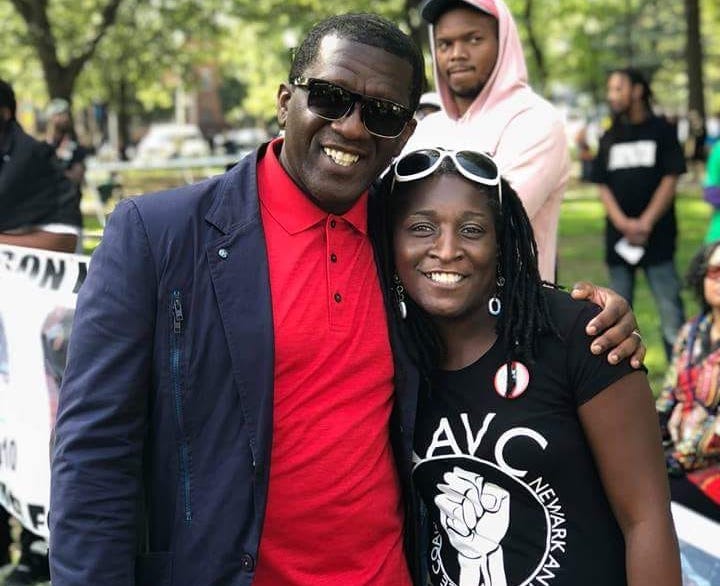
EJUSA Trauma and Healing Network member Lakeesha Eure is the director of the Shani Baraka Women’s Resource Center in Newark, NJ. Since co-founding the Newark Anti-Violence Coalition (NAVC) in 2009, Lakeesha has led community-based violence intervention efforts throughout the city
NAVC was founded to empower Newark residents with social and political awareness, and to support survivors in the midst of violence. As COVID-19 continues to disproportionately impact Black and Brown communities nationwide, Lakeesha has expanded her work to support survivors in the midst of collective trauma, financial insecurity, and uncertainty. We talked about those changes.
If you could identify one COVID-related need that stands out in your community and the people you work with, what would it be?
The lack of access to information is a major hindrance for those most at risk for domestic violence, community violence, and sexual assault. The assumption is that everyone is on social media, but our elders are not necessarily on social media. Domestic violence survivors are often restricted from technology by their partners, so they don’t have access to important information. Due to COVID, we don’t have door-to-door, store-to-store wellness checks with flyers in hand to give to people. During an election, we have door knockers, lawn signs, and posters everywhere. During this pandemic, we need the same. How do people get tested? Where can they get food? Where can they get resources?
What are you doing to meet that need?
We are doing regular wellness checks. Anyone who has ever walked into my center and put their name on a sign-in sheet has received a personal call, even multiple calls from different people on my staff. We have flyers and brochures we’re handing out to people in order to let them know that we are still open. We’ve shortened our hours, due to COVID, but we have an on-call person to answer phones if people need to reach us after hours. We’re trying to make sure that people still feel heard and responded to at all times. We’re trying to reduce some of the anxiety and fear people are feeling by being present and available.
What have you seen happening in your community that inspires your work?
Foundations like Victoria Fund and the Healthcare Foundation of NJ reached out to find out what’s happening on the ground and how they could support our needs. There was no red tape, they just asked for our needs and a fiscal sponsor, and then made it accessible within a week. Funds in hand! What if we could have that outside of a pandemic? Most grants require a bible-sized application, months to hear anything back.
The prosecutor’s office has been really helpful by providing escorts and accompaniment for victims fleeing violence. The hotel industry has been honoring requests with minimal red tape for people who are fleeing. Different social services organizations have been working with our organization to make sure The Women’s Center constituents have access to the resource they are providing. All it took was a phone call and resources were being provided with no lines, no wait, free of charge. The pandemic has erased a lot of bureaucracy and red tape.
Some leaders and grassroots organizations have increased their calls for reforms to our justice system, our health care system, and our financial system in the midst of COVID-19. Things like decarceration and universal health care are starting to be seen in a different light, as we notice the shortcomings of our existing systems. What transformations would you like to see take place not just in the midst of the pandemic, but permanently?
Local government agencies have been able to secure funding to house people during the pandemic. Can those funds be applied to long-term solutions? If you’re able to keep people from being evicted [during a pandemic], some of these things could be done going forward so people do not experience so much trauma around homelessness, being victimized, or hospitalized. If we could provide medication and hospital visits, continue to not criminalize people for misdemeanors, wave fees for late payments to utility bills, if places can provide meals every single day, if undocumented citizens can receive resources without worrying about ICE, why can’t we continue to do that going forward?
Your work centers survivors of domestic violence, as well as community violence. What kind of changes and challenges are you facing now due to COVID?
With both domestic and community violence, people are becoming a little more desensitized because they are not seeing it up close. Before COVID there was more outrage because people were seeing victims up close, seeing bodies in the middle of the street, witnessing stolen car chases. Families are grieving and they go through it by themselves, especially now with the limited number of people who can attend the funeral. People are not hearing about deaths as much. When one death occurs from violence, it is overshadowed by the 400 deaths from COVID. The pandemic has overshadowed the experience for people not directly impacted.



